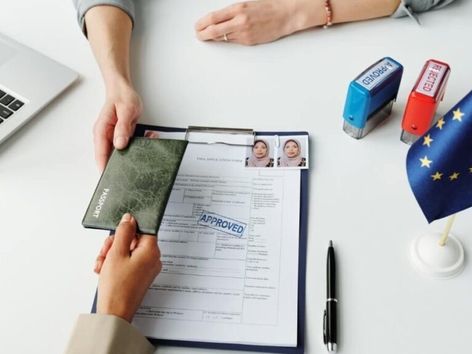Job in Romania for expats in 2024: work visa, labor market and where to look for work
Table of contents
- Can a foreigner work in Romania?
- Who needs a work permit to work in Romania?
- How to get a work permit and work visa to Romania?
- Can I move to Romania with my family?
- Where do expats work in Romania?
- How can a foreigner find a job in Romania
- Do you need to know Romanian to get a job in Romania?
- Average salary and working week in Romania
- Taxes in Romania

Romania's economy is developing at the expense of local enterprises, as well as international startups. The most opportunities for expats to work in the IT industry. Find out if foreigners can work in Romania and what the employment procedure is
Romania is one of the fastest growing economies in Europe, and this fact has been attracting foreign specialists for many years. Gradually, Romania is becoming a popular technology destination with a constant increase in foreign investment, so this country is now interesting for expats from different parts of the world looking for work.
Can a foreigner work in Romania?
Foreigners can get a job in Romania, but in order to get the right to work in Romania, an expat must meet a number of requirements:
- Obtain a medical certificate stating that the employee is fit for the activity.
- Not have a criminal record that could prevent you from carrying out the planned activity on the territory of Romania.
- Meet the employer's requirements regarding experience and professional training.
- To fall within the annual quota approved by the decision of the Government of Romania.
- Have confirmation that the selected position cannot be occupied by citizens of EU/EEA member states or citizens of Romania (for representatives of third countries).
Who needs a work permit to work in Romania?
- Citizens of the European Union, EEA and Switzerland do not need to obtain any documents to work in Romania. Representatives of these states can work freely in the country for 90 days and then register as a working resident in Romania.
- Third-country nationals must obtain a work visa before moving to Romania for employment.
How to get a work permit and work visa to Romania?
- Work permit for a foreigner in Romania
Work permits are job-specific, and the employer will usually take care of all the details of the application. In order to apply for a work permit in Romania, a potential employer of a foreigner must prove to the Romanian government that he has not been able to find a Romanian citizen or a representative of one of the EU countries for the position.
The employer must also prove that the candidate has the qualifications and experience for the position, documents for this must be provided by the expat (diplomas, certificates, etc.).
The process of obtaining a work permit in Romania can take several weeks.
- Work visa to Romania
After a foreigner receives a work permit from his employer, he can apply for a long-term visa to work at the Romanian embassy in the country of residence. To obtain a visa, you must submit a number of documents:
1. the original of the foreign passport, a copy of the internal document;
2. 2 new photos 3.5*4.5;
3. filled out without errors in one of the two languages (English, Romanian) questionnaire;
4. contract with the employer;
5. work permit;
6. certificate of criminal record in your country;
7. health insurance policy (EUR 30,000 coverage);
8. other documents required by the embassy.
In order to safely move, travel or work in a new country, you will need health insurance. You can issue an extended policy on our website using the link.
- Upon arrival in Romania
Upon arrival in Romania, a non-EU expat will need to register with the Romanian Ministry of Finance and obtain their CIF identification code (Cod de Identificare Fiscala, CIF), a taxpayer registration certificate that has functions similar to a personal identification number. numbers
- Extension of work permit
The working visa is valid for 1 year, then an extension is possible, and then obtaining an ID card for permanent residence.
It is possible to extend the visa, provided that you are still working for the same employer. This must be done at least 30 days before its expiration, and the work permit will also be extended.
Can I move to Romania with my family?
You can move to Romania with your family. However, for this, you need to apply for a separate visa for each family member.
Family members are not allowed to work in Romania unless they also have their own work permit. Those already in the country with a temporary residence permit will need to apply for a work permit if they want to work in the country.
Where do expats work in Romania?
The majority of foreigners work in Romania in highly qualified positions, in particular, the greatest shortage of personnel is felt in the following sectors: IT sector, marketing, production, tourism, communication, textile industry, security, trade, mechanical engineering, etc.
The IT industry ranks #1 when it comes to job opportunities. So for foreigners who want to work in this field, Romania is a great place to fulfill their desire.
The most opportunities for work are in big cities such as Bucharest, Cluj-Napoca, Timisoara or Iași. Smaller cities attract expats who want to work in small companies.
How can a foreigner find a job in Romania
To find a job, use one of these methods:
- Contact an employment agency, their task is to inform about the availability of job offers and advise job seekers.
- View ads in national newspapers: Ziarul Evenimentul, Ziarul Financiar, The Diplomat, Piata AZ, etc.
- Visit online portals - Olx.ro, Ejobs.ro, Publi24.ro, Bestjobs.eu, Hipo.ro and many others.
Do you need to know Romanian to get a job in Romania?
Knowledge of the Romanian language will contribute to employment, as well as comfortable living in the country.
However, English-speaking expats will be able to work in international companies or become an English teacher.
Average salary and working week in Romania
The average net salary of workers in the country varies by industry. In the IT industry, the average salary for an entry-level employee is between 550 and 1,600 euros. This is higher than other industries with an average salary of 500-700 euros.
The duration of the working week is 40 hours, and the annual leave is from 15 to 30 working days.
Taxes in Romania
The taxation system in Romania has a single tax rate of 10% on the income of individuals and 16% on the income of companies. Some smaller companies, i.e. micro-enterprises, pay lower taxes. Social security contributions are 15.5% for employees and up to 32.6% for employers.
Romania is a modern country that is actively developing its economy and offers expats career prospects. Add to that a rich culture, numerous historical sites, fabulous mountain scenery, friendly locals and a strong social sphere and you have the perfect place to move.
We will remind you! Romania is a country in Eastern Europe that attracts expats with its growing economy and affordable cost of living. In order to move to the country for permanent residence, it is necessary to issue a visa and obtain the appropriate permission. Read this article about the rules for entering Romania that are relevant in 2024 and the procedure for obtaining a permanent residence permit.
Igor Usyk - Head of Migration department at VisitWorld
To ensure a safe move to a new country, I advise you to consult a specialist. My colleagues, qualified specialists with a legal education, will help you avoid unpleasant situations during migration.
Products from Visit World for a comfortable trip:
Checklist for obtaining a visa and necessary documents for Romania;
Legal advice on immigration to Romania;
Travel insurance for foreigners in Romania;
Medical insurance all over the world.
Recommended articles
3 min
Work
Job in Slovakia for expats in 2024: work permit, job search and changes to migration legislation
Slovakia is known for its breathtaking scenery and historical sites, but you may not know that it is also home to a thriving market economy. Due to the low cost of living and job opportunities, the country offers good prospects for career growth. Find out what it takes to get a job here in 2024
23 Aug. 2024
More details3 min
Expats
Ranking of countries with the lowest taxes for foreigners in 2024
There are many countries around the world that attract foreign investors and businessmen with their lenient tax policies. These countries offer a wide range of benefits, making them an ideal place to do business and invest. Learn more about the countries with the lowest taxes for foreigners in 2024
18 Sep. 2024
More details3 min
Travels
Romania part of the Schengen zone: why should tourists visit the country in 2024?
In the spring of 2024, Bulgaria and Romania partially joined the European Schengen area of free movement. These changes have made travel to countries easier for millions of travelers. Find out why tourists should visit Romania in 2024
11 Aug. 2024
More details3 min
Work
Germany reduces visa processing time for workers from India: what is known
The German government has decided to reduce the waiting period for a visa for skilled workers from India from 9 months to 2 weeks. Find out more about the details of the initiative, available vacancies and required documents for applying for a German work visa
21 Aug. 2024
More detailsAll materials and articles are owned by VisitWorld.Today and are protected by international intellectual property regulations. When using materials, approval from VisitWorld.Today is required.
